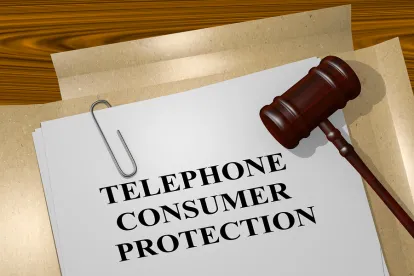Thanks to the Supreme Court’s decision in Facebook v. Duguid, 141 S. Ct. 1163 (2021), 2021 will go down as one of the most significant years in the history of the Telephone Consumer Protection Act, 47 U.S.C. § 227 (“TCPA”). And while the second half of 2021 did not produce the fireworks that we saw earlier in the year, there are still some cases worthy of note as we enter the new year. We summarize here developments since our last update, listed by issue category in alphabetical order.
Advertisement
In BPP v. CaremarkPCS Health, LLC, 2021 LEXIS 216536 (E.D. Mo. Nov. 9, 2021), the district court handed a victory to the defendants and granted summary judgment to Caremark in an unsolicited fax case. Plaintiff alleged that Caremark, a pharmacy benefit manager, sent a fax to more than 55,000 doctors and healthcare providers notifying them of new supply limits on opioid prescriptions for certain pediatric and adolescent patients covered by plans sponsored by Caremark clients. Id at *1-2. The court held that the fax only notified recipients (health care providers) of changes to certain patients’ insurance coverage and did not promote any products or services, meaning it was not an advertisement. Id. at *7. The court reasoned that the fax at issue was purely informational and simply informed plaintiffs of the supply limit and provided “up to date information to keep doctors (such as Plaintiff) informed about changes to the terms of their patients’ prescription coverage.” Id. at *4. The fact that the fax at issue mentioned certain Caremark services did not convert it into an advertisement because the “primary purpose” of the fax was “informational, rather than to promote commercial products.” Id at *6.
Class Certification
In Mattson v. New Penn Financial, LLC, 2021 U.S. Dist. LEXIS 128294, at *1 (D. Or. July 9, 2021), the district court granted a defendant’s motion to deny class certification based on lack of typicality and commonality. A magistrate judge had issued a Findings and Recommendation in which she recommended the denial of class certification, and the plaintiff filed objections. Id. at *1. The magistrate found that class certification should be denied because “questions remain[ed] concerning whether plaintiff had [Article III] standing to bring a claim under the [TCPA].” Id. at *2. The magistrate also found that plaintiff was an inadequate class representative because he could not meet the typicality and commonality requirements of Rule 23. The district court, in considering the objections to the Findings and Recommendation, rejected the magistrate’s recommendation on Article III standing, instead finding that Plaintiff did in fact have standing because he personally suffered an injury when he was called on what he alleged was a residential phone number after placing it on the Do Not Call Registry. Id. at *3. The district court agreed with the magistrate, however, on the issue of adequacy of class representation. The court found that “individual questions concerning whether he is a residential subscriber subject to the TCPA’s protections will predominate the litigation.” Id. at *4. The case is noteworthy, and offers support for TCPA defendants arguing against class certification, but defendants should note the less favorable Article III standing portion of the decision before citing this one.
In Jeffrey Katz Chiropratic, Inc. v. Diamond Respiratory Care, Inc., 2021 U.S. Dist. LEXIS 236314 (N.D. Cal. Dec.9, 2021), the district court denied class certification in a fax case where some, but not all, of the fax recipients had given consent. Id. at *5-6. The district court held that “[b]ecause consent can only be determined on an individualized basis, common issues do not predominate” and “because meritorious individual claims might be resolved in small claims court, the class action is not ‘superior to other available methods for fairly and efficiently adjudicating the controversy.’” Id. at *11.
Do-Not-Call
In Fischman v. MediaStratX, LLC, 2021 U.S. Dist. LEXIS 149734, at *1 (E.D.N.C. Aug. 10, 2021), the district court addressed whether the FCC’s do-not-call (“DNC”) rule, 47 C.F.R. § 64.1200(d), creates a private right of action for telephone subscribers who receive calls in violation of that rule’s “minimum standards.” In holding that the rule was passed pursuant to 47 U.S.C. 227(c), which does create a private right of action, the court took a side in the ongoing split among federal courts as to which provision of the TCPA gives rise to the DNC rule. In moving to dismiss, the defendant argued that an action for an alleged violation of Section 64.1200(d) could not be maintained because the FCC promulgated the DNC rule under 47 U.S.C. § 227(d), which does not create a private right of action for violations of implementing regulations. Id at *10-11. The plaintiff argued that the DNC rule was passed pursuant to 47 U.S.C. § 227(c), which does create a private right of action for such violations. Id. The court agreed with Plaintiff, while acknowledging that there was a split among the courts as to whether Section 227(c) or 227(d) applied. Id. at *12-13. The court found that Section 227(c) applied because of its “requirements that the FCC promulgate rules to protect residential telephone subscribers’ privacy rights.” Id. at *12-13. It remains to be seen whether the Supreme Court or the FCC will definitively answer whether plaintiffs can bring a private cause of action for the DNC rule.
Vicarious liability
In Schick v. Caliber Home Loans, Inc., 2021 U.S. Dist. LEXIS 176765, at *1 (N.D. Cal. Sept. 14, 2021), the district court granted defendants’ motion for summary judgment, finding that the defendants could not be held vicariously liable for a subcontractor’s TCPA violations. Caliber Home Loans (“Caliber”) hired a company called NexLevel to help generate leads for its home loan business. Id. at *2. The contract between Caliber and NexLevel required NexLevel to perform or provide services in full compliance with all applicable laws, and prohibited NexLevel from engaging a subcontractor without Caliber’s express written consent. Id. Despite this, NexLevel hired a company called Driving Force to provide leads, and did so without Caliber’s consent or knowledge. Id. Driving Force then called plaintiff twice on a number listed on the Do Not Call Registry. Id. Plaintiff sought to hold Caliber and NexLevel vicariously liable for these calls. Id. But the court determined that the plaintiff failed to prove any basis for vicarious liability for either defendant. As to Caliber, the court found that it had not ratified the calls, in part because it did not even know that NexLevel had engaged Driving Force. Id. at *3. The court further found that Driving Force did not act as an agent of Caliber and that Caliber had acted quickly, even canceling its agreement with NexLevel when it found out about customer complaints. Id. at *4. As to NexLevel, the court found that plaintiff failed to prove actual authority or ratification. Id. at *5-7.




 />i
/>i
